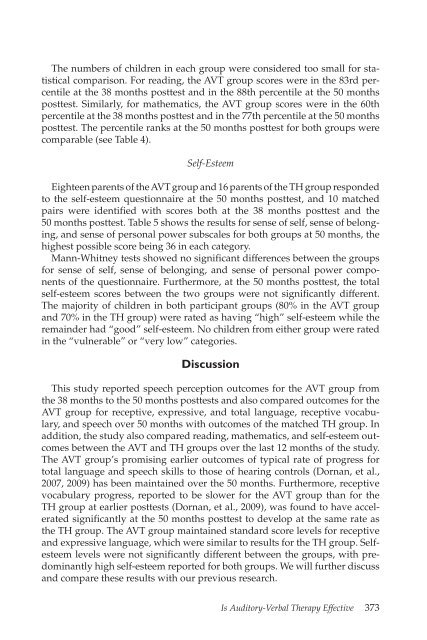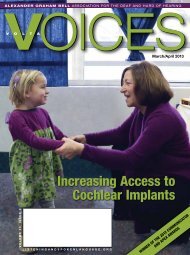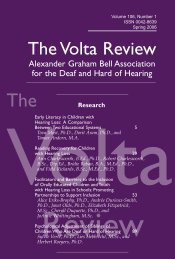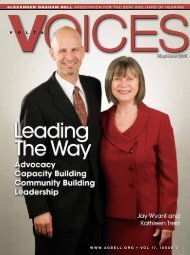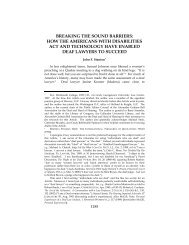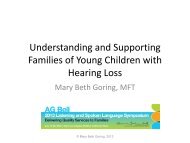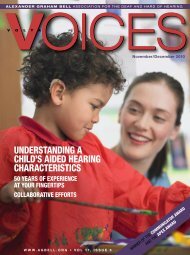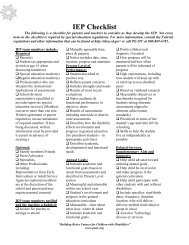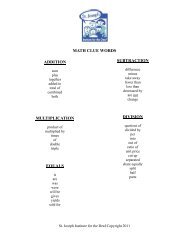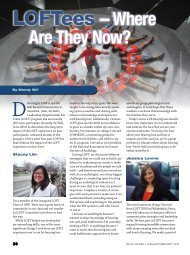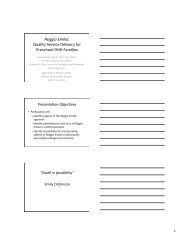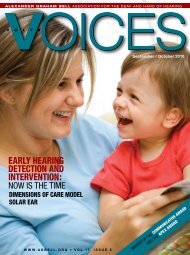Download this issue - Alexander Graham Bell Association
Download this issue - Alexander Graham Bell Association
Download this issue - Alexander Graham Bell Association
You also want an ePaper? Increase the reach of your titles
YUMPU automatically turns print PDFs into web optimized ePapers that Google loves.
The numbers of children in each group were considered too small for statistical<br />
comparison. For reading, the AVT group scores were in the 83rd percentile<br />
at the 38 months posttest and in the 88th percentile at the 50 months<br />
posttest. Similarly, for mathematics, the AVT group scores were in the 60th<br />
percentile at the 38 months posttest and in the 77th percentile at the 50 months<br />
posttest. The percentile ranks at the 50 months posttest for both groups were<br />
comparable (see Table 4 ).<br />
Self-Esteem<br />
Eighteen parents of the AVT group and 16 parents of the TH group responded<br />
to the self-esteem questionnaire at the 50 months posttest, and 10 matched<br />
pairs were identified with scores both at the 38 months posttest and the<br />
50 months posttest. Table 5 shows the results for sense of self, sense of belonging,<br />
and sense of personal power subscales for both groups at 50 months, the<br />
highest possible score being 36 in each category.<br />
Mann-Whitney tests showed no significant differences between the groups<br />
for sense of self, sense of belonging, and sense of personal power components<br />
of the questionnaire. Furthermore, at the 50 months posttest, the total<br />
self-esteem scores between the two groups were not significantly different.<br />
The majority of children in both participant groups (80% in the AVT group<br />
and 70% in the TH group) were rated as having “high” self-esteem while the<br />
remainder had “good” self-esteem. No children from either group were rated<br />
in the “vulnerable” or “very low” categories.<br />
Discussion<br />
This study reported speech perception outcomes for the AVT group from<br />
the 38 months to the 50 months posttests and also compared outcomes for the<br />
AVT group for receptive, expressive, and total language, receptive vocabulary,<br />
and speech over 50 months with outcomes of the matched TH group. In<br />
addition, the study also compared reading, mathematics, and self-esteem outcomes<br />
between the AVT and TH groups over the last 12 months of the study.<br />
The AVT group’s promising earlier outcomes of typical rate of progress for<br />
total language and speech skills to those of hearing controls (Dornan, et al.,<br />
2007, 2009) has been maintained over the 50 months. Furthermore, receptive<br />
vocabulary progress, reported to be slower for the AVT group than for the<br />
TH group at earlier posttests (Dornan, et al., 2009), was found to have accelerated<br />
significantly at the 50 months posttest to develop at the same rate as<br />
the TH group. The AVT group maintained standard score levels for receptive<br />
and expressive language, which were similar to results for the TH group. Selfesteem<br />
levels were not significantly different between the groups, with predominantly<br />
high self-esteem reported for both groups. We will further discuss<br />
and compare these results with our previous research.<br />
Is Auditory-Verbal Therapy Effective 373


